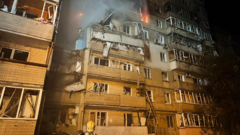Are Female Veterans Getting the Support They Need After Leaving the Military?

Published: 2025-09-07 00:21:07 | Category: technology
Women who have served in dangerous front-line roles during military conflicts, such as those in Iraq and Afghanistan, often face unique challenges that demand greater recognition and support. Dr Bex Bennett, a former soldier and NHS psychiatrist, highlights the need to change outdated perceptions about women's contributions to the military and to provide a supportive community for female veterans through initiatives like the Sisters in Service.
Last updated: 21 October 2023 (BST)
Understanding the Role of Women in the Armed Forces
Women have long been part of military operations, yet many still hold the misconception that combat roles are predominantly male. Despite this, women have performed critical roles in various capacities, often facing the same dangers as their male counterparts. Dr Bennett’s experience in Iraq and Afghanistan illustrates the complexities of these roles.
- Women in the military often take on front-line roles, challenging traditional gender norms.
- Community support networks like Sisters in Service are vital for female veterans.
- Many female veterans face difficulties in transitioning to civilian life.
- Understanding and recognition of women's military experiences are crucial to their mental health.
- Misconceptions about women in the military can lead to feelings of isolation.
The Experience of Female Veterans
Dr Bex Bennett, who co-founded Sisters in Service, shares her own experiences of serving in the British Army. Trained at Sandhurst alongside the Duke of Sussex, she served with the Royal Electrical and Mechanical Engineers and undertook various missions, including those that required interaction with local populations. Her story reflects the often-overlooked contributions women make in military operations.
Combat Roles and Beyond
Despite the vital roles women play, there is a lingering stereotype that women do not serve on the front lines. Dr Bennett points out that women often engage in critical tasks like searching female civilians, which is essential for operational success. Her anecdote of surviving mortar fire in Iraq underlines the real dangers faced by women in these roles.
Transitioning to Civilian Life
Transitioning from military to civilian life can be particularly challenging for female veterans. Dr Bennett states that many women feel isolated after leaving the military, as their experiences are often misunderstood or dismissed. This isolation can have serious implications for mental health and overall well-being.
Sisters in Service: Building a Supportive Community
Sisters in Service, founded by Dr Bennett and Gemma Saunders, aims to create a supportive network for female veterans. The organisation has grown to 160 members since its inception in May last year. By facilitating meetings and activities, Sisters in Service provides a vital space for women to connect and share their experiences.
Activities and Engagement
The group organises various activities to foster camaraderie among female veterans. These include:
- Social gatherings for meals and coffee.
- Dog walks in Derbyshire and Nottinghamshire.
- Online meetings for members living farther away.
- Plans for fitness activities and residential retreats.
Such initiatives help to build a sense of community, allowing women to bond over shared experiences and support one another through the challenges of adjusting to civilian life.
Real Stories from Female Veterans
Mel Dyke, a member of Sisters in Service, shared her own transition story. Leaving the Army while pregnant, she found herself in a new, civilian environment that felt foreign and isolating. Her experiences in Iraq, where she provided female searches, highlight the importance of recognising the varied roles women hold in military operations.
The Emotional Toll of Service
For women like Mel, the emotional toll of military service can be profound. After transferring to the Queen Alexandra's Royal Army Nursing Corps, she faced the challenge of treating friends who were battle casualties, adding an extra layer of complexity to her transition back to civilian life.
The Importance of Recognition and Support
Dr Bennett argues that more recognition is needed for women's contributions in the military. This includes understanding their experiences and the unique challenges they face. Misconceptions about women's military service can lead to their marginalisation within veteran communities, such as the Royal British Legion.
Breaking Down Barriers
Dr Bennett emphasises that women often feel daunted by traditional veteran spaces, which may not fully acknowledge their service. Sisters in Service aims to break down these barriers, fostering an environment where women can share their stories and seek support without judgement.
Enhancing Awareness and Understanding
As Dr Bennett continues her work with Sisters in Service, she stresses the importance of spreading awareness about women's front-line roles. She believes that recognising these contributions not only validates their experiences but also encourages other women to come forward and share their stories.
Future Directions for Sisters in Service
Looking ahead, Sisters in Service aims to expand its reach and impact. This includes increasing membership and enhancing the variety of activities offered to better meet the needs of female veterans. Dr Bennett is committed to ensuring that women who have served are acknowledged and supported in their journeys.
Conclusion
Women in the military have played a crucial role in modern conflicts, yet their contributions often go unrecognised. Initiatives like Sisters in Service are essential for providing the support and community that female veterans need. By raising awareness and breaking down barriers, we can help ensure that these women receive the recognition and support they deserve.
How can we further support female veterans in their transition to civilian life? It is time to listen, learn, and act to create a more inclusive environment for all who have served. #WomenInTheMilitary #VeteranSupport #SistersInService
FAQs
What is Sisters in Service?
Sisters in Service is a community interest company co-founded by Dr Bex Bennett and Gemma Saunders that supports female military veterans in the UK through networking and shared experiences.
How can female veterans benefit from joining Sisters in Service?
Members benefit from a supportive community where they can connect with others who have experienced similar challenges, access resources, and participate in activities that foster camaraderie.
What kind of activities does Sisters in Service organise?
Sisters in Service organises social gatherings, dog walks, online meetings, fitness activities, and residential retreats to promote connection among female veterans.
Why do some female veterans feel isolated after leaving the military?
Many female veterans feel isolated due to misconceptions about women's roles in the military and a lack of understanding from the civilian community, which can hinder their transition.
What challenges do female veterans face in traditional veteran environments?
Female veterans may encounter misconceptions about their service, leading to feelings of exclusion or being underestimated in traditional veteran spaces like the Royal British Legion.



